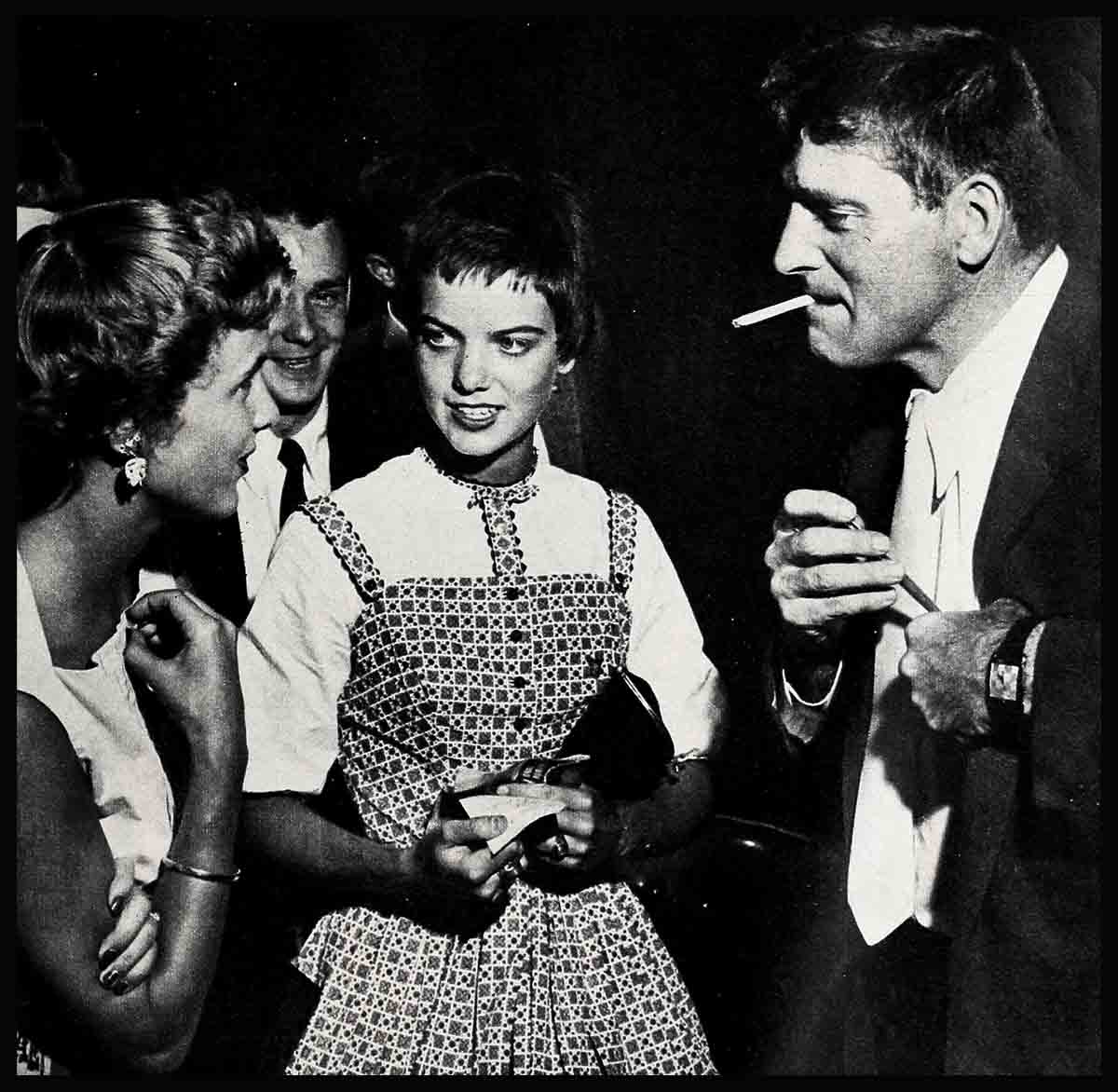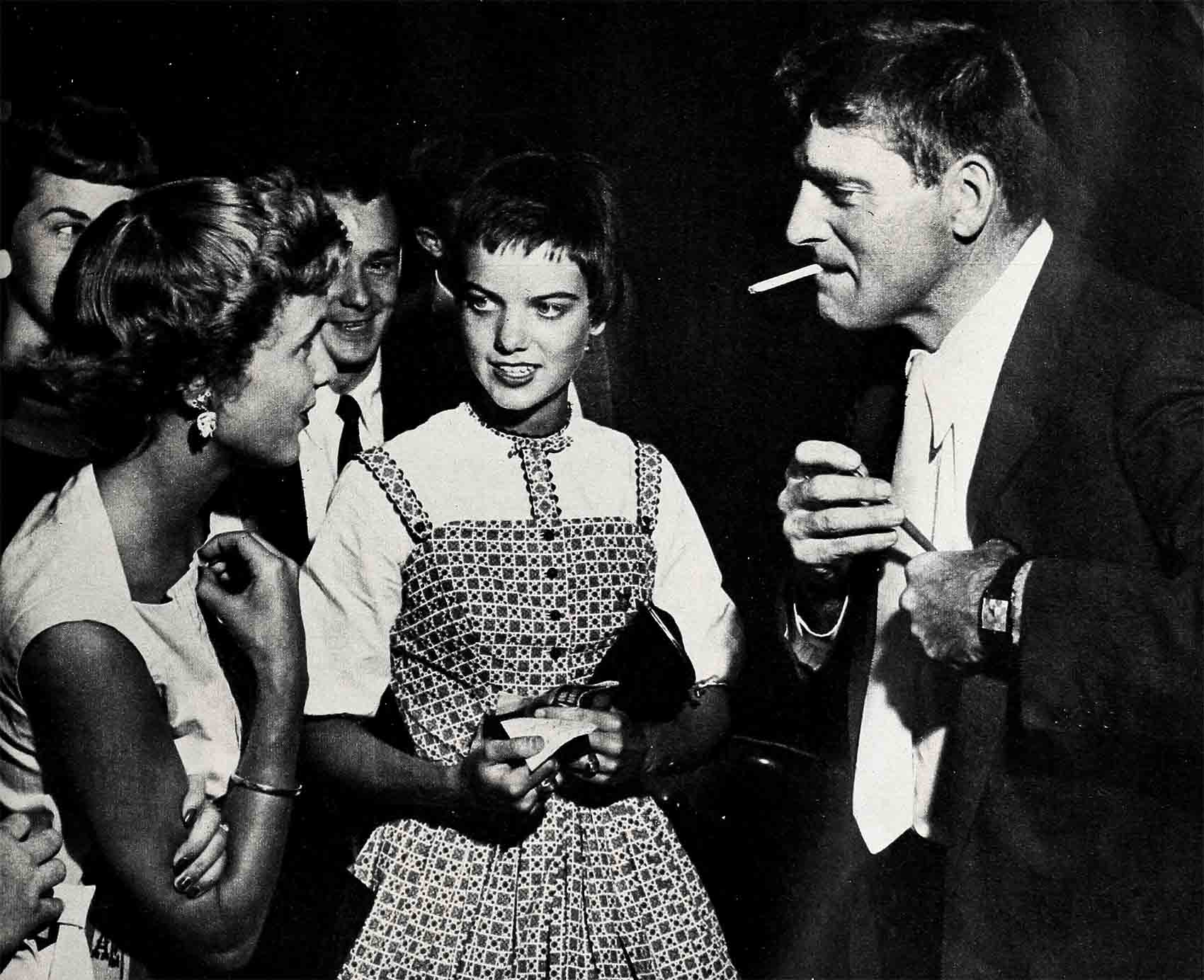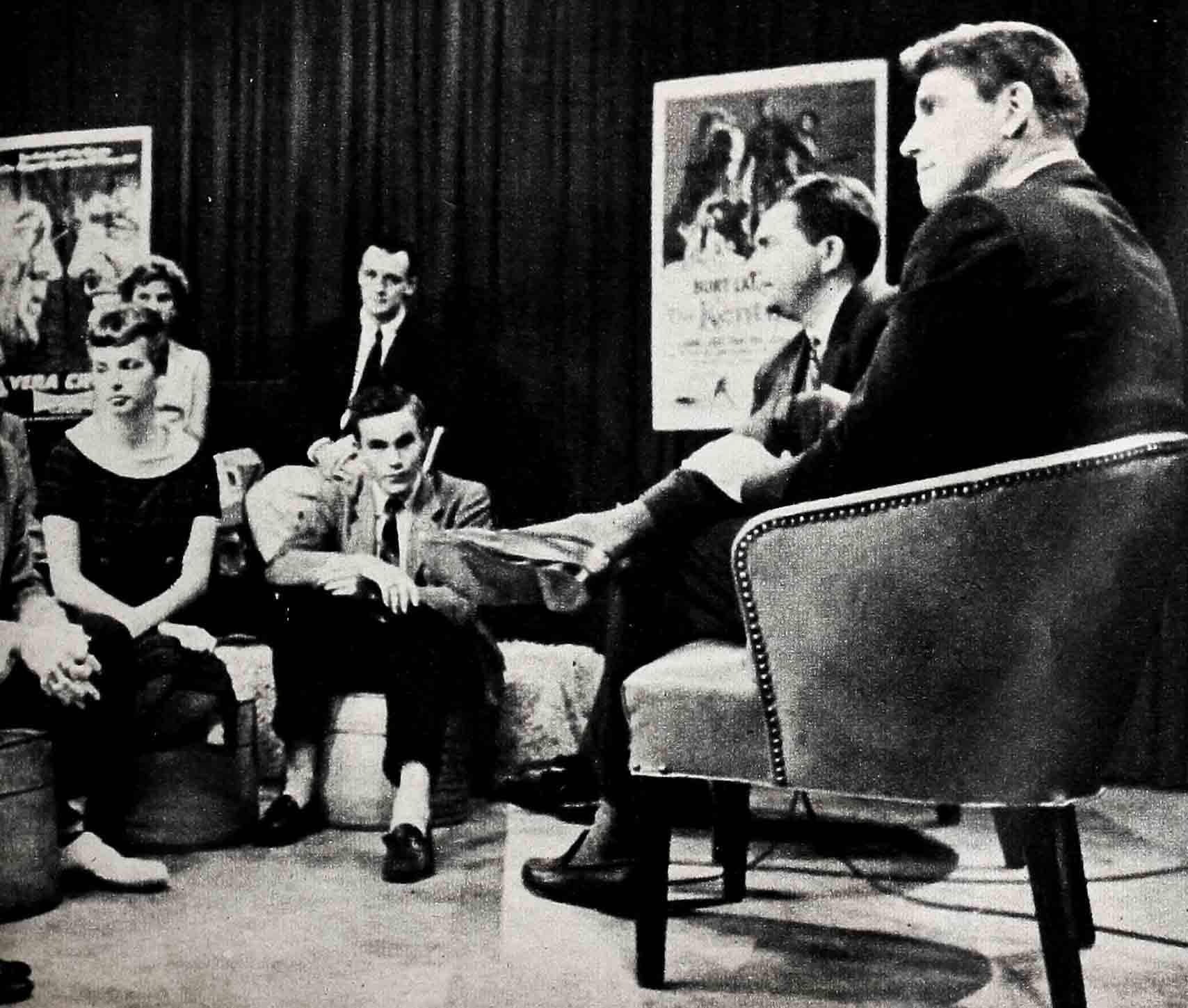
Please Tell Us, Mr. Burt Lancaster . . .
Twenty high school students were lucky enough, recently, to interview Burt Lancaster, who is currently breaking boxoffice records as the star of his own film, “The Sweet Smell of Success.” And the teens broke a record of their own. “It was one of the toughest interviews I’ve been put through,” Burt admitted at the end. The questions ran through everything from sex and censorship to the high price of the neighborhood movie and Marilyn Monroe.
There wasn’t a dull moment.
STUDENT: Sir, does the average American moviegoer’s preference for films dealing with crimes, sex and violence indicate that he cannot appreciate more refined acting and drama? I’ve wondered about this.
MR. LANCASTER: No, I don’t think that is necessarily true. I think you will find most people go to movies for purposes of relaxation, and they like to see things on the screen that cause visual excitement but that don’t particularly disturb or distress them too much—or make them think too hard.
STUDENT: In other words, intellectual movies would not appeal to the average American moviegoer?
MR. LANCASTER: To the average American moviegoer, no, I would say.
STUDENT: In this light, do you feel that you are debasing yourself when you are acting, just to satisfy American moviegoers’ cravings and likes?
MR. LANCASTER: No, I think you have responsibilities to the likes and dislikes of people. What we as a group have to try to do in the making of movies is to make those that will appeal to a large, mass audience. We must also try to make movies that will appeal to, shall we say, a smaller and minority group. And as long as we maintain our own standards of what we like, we will find we can make pictures that can appeal to all peoples. Not all the time, though.
STUDENT: Mr. Lancaster, as a producer, would you tell me this: When you choose a picture, do you choose one that is popular with the American public even though you personally feel that story is not too good?
MR. LANCASTER: Not always. Well, no, we would never choose a picture if we felt the story is not too good; that is, if it doesn’t have the basic ingredients of what would represent drama and entertainment to people.
STUDENT: Mr. Lancaster, do you feel that movies such as “The Man with the Golden Arm” gives Europeans the wrong impression of America?
MR. LANCASTER: I don’t think any picture gives European people a wrong impression of America if it is well made and made with honesty and integrity as to the subject matter.
STUDENT: Well, do you think such movies encourage juvenile delinquency here in the United States?
MR. LANCASTER: I think juvenile delinquency is not encouraged by movies, specifically. I think juvenile delinquency is encouraged by unfortunate economic conditions and conditions in homes where children don’t have a proper upbringing because, very often, of those conditions.
STUDENT: Sir, we know now there are a lot of foreign actors and actresses over the United States. Do you think the American public seems to like these people much better than their own people, those they see all the time?
MR. LANCASTER: No. This brings up the question of what makes really a star performer. American people and, of course, European people and people all over the world, for that matter, like the performer who has that unique personality and quality which appeals to them personally. It has nothing to do with the fact that they are, shall we say, of foreign extraction, I don’t think.

STUDENT: Do you feel foreign films are going to make any great inroads into the habits of the American movie-going public?
MR. LANCASTER: I think time has proven at least that foreign films as such do appeal only to a limited group of Americans. Again, it goes back to the original question that was asked earlier. One of the reasons is that American people as such are more comfortable with a subject matter that pertains to things that they particularly understand. Foreign people talk with accents that are very hard to understand. Very often, they have a very grim and brutal kind of realism which a great many American people do not like to see, since they do not have any identification with the problems. These are some of the reasons foreign films are not especially successful in a broad sense in the American cinematic world.
STUDENT: I am interested in knowing why you think western films should be done necessarily with fun and action.
MR. LANCASTER: It isn’t that they necessarily should; and a peculiar thing happens in movies. You see, there have been pictures like “High Noon,” for instance, which have been highly successful. On the other hand, there have been pictures like the one I made with Gary Cooper called “Veracruz,” which by critical standards does not measure up to a “High Noon,” but which is a much more satisfying picture from the point of view of entertainment. There is also another problem: When you make a film of a special nature that will appeal to limited groups of people, you have to face the fact that these films are not in the broad sense of the word, popular. Therefore, when you do them, you must be careful that you do them for a certain price, because you have a limited income on such films, and the first cardinal rule of making pictures or writing a play or any form of entertainment is to make something that is financially successful. If they are not successful, you don’t continue in business, and you have no opportunity ‘to present the ideas that you think are unique or even artistic.
STUDENT: How does Hollywood face competition between TV and movies?
MR. LANCASTER: What Hollywood has attempted to do about it is this: Actually, it is my personal opinion that the advent of TV, as far as Hollywood is concerned, has been a very, very healthy thing. There was a time, about ten short years ago, when almost anything that came out of Hollywood could be assured of reasonable financial success. Naturally, this sort of lulled people into a sense of false security, and there was not a great deal of attempt on the part of the studios to try to do anything worthwhile and different and challenging. Now that great inroads have been made in the whole financial structure of Hollywood, they have realized they have to do better things, things that are more exciting, more challenging so that people will leave their television receivers and come out to look at them.
STUDENT: Sir, I have read you do not attend many Hollywood social functions. Don’t you like the type of people at these functions?
MR. LANCASTER: Oh, yes. It has nothing to do with the functions. It is just that I have a group of friends that I would prefer to be with. For example, my wife and I like to play bridge. I have never been particularly comfortable or at ease in large social functions, cocktail parties, and so forth.
STUDENT: Would you ever encourage your own children to go into acting if they wanted to?
MR. LANCASTER: I would certainly do it. I feel a child should have an opportunity to do anything he has an inclination toward.

STUDENT: Do yours watch you when you are performing in movies?
MR. LANCASTER: Yes, and they’re among my toughest critics. They have traveled with me all over the world while I was making movies. They have lived in the Fiji Islands for four months and attended school there, they attended school in Mexico City, they have lived in France for the summer and they have lived in Italy for six months when I was there making a picture. But now they have reached the age where it is very difficult for them to go with me because they go to school. They have certain ties there, so I try to arrange my program so if I am shooting on location, it occurs in the summertime so I can take them with me.
STUDENT: Mr. Lancaster, you mentioned a few minutes ago about the entertainment of movies, and that is why people go to movies, to be entertained. But it seems to me a juvenile delinquency film or a film on corruption in life, the baseness in life, would be rather not too entertaining.
MR. LANCASTER: Let me make clear what I mean by entertaining. Every movie that is made has a point of view, whether it is a good one, a bad one, a useful one or what. By entertainment, I mean that regardless of what the subject matter may be, it should have an entertainment quality to it. That does not mean that the subject should not be treated with great seriousness, and great depth and great definition.
STUDENT: I was wondering if the type of film such as “On the Waterfront,” where you can come out fighting mad and want to clean up the waterfront, has the purpose of reforming. Or “Baby Doll.”
MR. LANCASTER: Well, about “Baby Doll,” I would quarrel with you. But certainly on “On the Waterfront” I agree with you.
STUDENT: Most of your films are hard-bitten, often violent, dramas. Do you object to your children seeing them?
MR. LANCASTER: Here is what I try to do. I let my children see the films that I am in. Some of them—for instance, “Come Back Little Sheba,” which I think is a worthwhile picture in addition to being an entertaining one—are difficult for their immature minds to understand completely. But rather than have them not see it, if they ask to see it, I let them, but I make sure to see it with them so I can try to answer all the questions they might raise. Therefore, I hope I can give them some sense of security about it, even those matters they might not particularly understand.
I would like to cite an example of just that. My little boy asked yesterday to see “Sweet Smell of Success,” which is also a very hard-bitten picture and not what you would normally call children’s fare. I said, “Well, Jimmie, that is fine; you can see the picture. But I don’t think you will like it. Why do you want to see it?”
“Well,” he said, “I’d like to see it, Daddy, because you’re in it.”
“That is fair enough,” I said, “but I don’t think you will understand it.” And he answered, “I may not understand it, but that doesn’t mean I won’t like it.”
STUDENT: Mr. Lancaster, what is the reaction of producers to censorship groups?
MR. LANCASTER: As you probably know, there is no official censorship problem in the movies in the United States or any official censorship at all. This is not so in England, where they do have an official government censorship, and can refuse you a license to show a picture. In short, they have a police force that can stop you from showing the picture. There is the Johnson office which has its headquarters here in Washington, and is a self-imposed censorship by the industry. It is known as the MPPA—Motion Picture Producers Association. Their attitude is this: They say to the producers, “In order to protect the morality of the nation as it might be affected by motion pictures, if you will let us see the scripts you are going to make, we will attempt, not to censor, mind you, what you are trying to say, but attempt to guide you in matters of how to handle these problems as best you can.”
Now, of course, it always comes to the question of who are the people who are going to decide this, how knowledgeable are they, do they know better than the actual creators of the motion picture?
What has happened is that in recent years (and I think this a very healthy thing) the MPPA has been forced to recognize—perhaps not forced but has willingly recognized—the fact that enormous advances have been made in the general education of the American public and, therefore, the subjects which were considered taboo before are now permitted.
So what has happened is this: The old code has been enormously changed. The whole attitude of the so-called censor board has improved a great deal. We do now show pictures in which words like “abortion” and “prostitution” are mentioned, and in which we discuss divorce problems, and then, of course, there is the matter of narcotics, which was recently brought up in several pictures. The picture “Hatful of Rain” now has been approved by the board, where before the “Man with the Golden Arm” was not approved. It looks like things are looking up in the censorship problem.
STUDENT: I would like to know, would you agree with some critics who say that Jayne Mansfield and Marilyn Monroe have acting talents equal to their more obvious appeals?
MR. LANCASTER: Well, I don’t know what the critics feel about it. That is their opinion. One of the things I would like to be made clear about movies—again it goes back to the business of being a star: The most unique thing a motion picture actor or actress can have is an outstanding or peculiar personality of some kind. And these girls certainly have some outstanding qualities that appeal to people visually, at least. Those are the elements most important in the making of a motion picture star. Not necessarily the acting ability as such. On the other hand, to be a good actor, to be an exciting personality on the screen, of course, is that much better.
STUDENT: Who is the most beautiful woman you have ever acted with?
MR. LANCASTER: They were ll beautiful. I am just quoting my lines from “The Rainmaker.” “They are all beautiful in a different way.”
STUDENT: I want to know what your wife thinks about your performing in movies and having these torrid love scenes with Hollywood leading ladies.
MR. LANCASTER: The torrid love scene you have with a Hollywood leading lady is, from our point of view while we are in the process of making it, “work.”
You have a job. You are creating an illusion for an audience to see, and the only assurance I think that my wife has is that she knows I love her, and that is about all I can say on that subject.
STUDENT: I am interested in knowing why you didn’t change your name when you started acting. Most actors and actresses do.
MR. LANCASTER: As a matter of fact, I did want to change my name. They were going to give me the name of an economist, Stewart Chase. They decided this by numerology. Then a gentleman by the name of Mark Hellinger, who is now dead, and who produced the first picture I was in, “The Killers,” said to me, “Is Burt Lancaster your real name?”
I said, “Yes.”
He said, “What’s wrong with that?”
I said, “Nothing.”
He said, “Let’s use it.”
I said, “O.K.”
STUDENT: Sir, because of television, do you think that the pictures now coming out might break down some of the prices that these theatres have? In other words, producing prices and everything?
MR. LANCASTER: You think the prices are too high?
STUDENT: Well, yes.
MR. LANCASTER: I know this has been a subject of great discussion among distributors, because I have also been in that end of the business since my pictures are distributed and exhibited. The feeling is they try to keep the economic level of prices and pictures as low as possible since it is, first of all, a traditional thing and the people who generally support the pictures are not those who have a great deal of money, normally speaking.
I will glady say this: The distribution groups would gladly put a picture up for a nickel tomorrow if the cost of production would permit them. There is no desire on their part to try to cheat the public. Sometimes pictures are so expensive they have to charge certain prices in order to get any kind of income from them.
“This has been one of the most provocative questioning sessions I’ve ever gone through. Our young people are really serious about motion pictures,” said Burt as time ran out and the interview came to a close. “Anyone who says American teenagers are delinquents is all wet. I am grateful to the National Broadcasting Company’s ‘Youth Wants to Know,’ and the National Education Association for bringing us together today.”
THE END
It is a quote. PHOTOPLAY MAGAZINE DECEMBER 1957





No Comments